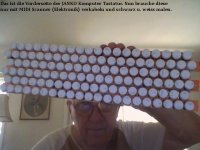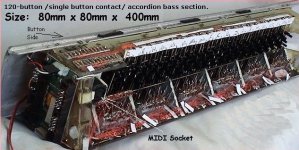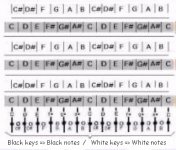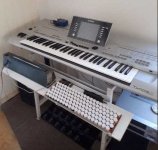It was always my ambition to create an easy to learn and play accordion style musical instrument, but it took me ages to get my act together. Finally, step by step I built the DIY components for it: Result:
1) I converted a 120-button accordion bass to Midi.
2) From 3 PC plates I created a 6x6 JANKO keyboard
3) I created a WYSIWYG notation for it (similar to Klavar notation).
It can't get any easier (!!) and to make it sound like a real accordion I got myself the latest XXL MASTER ACCORDION from V3 sound modules, pairing it with an equally excellent MidiToolEx software and voilà, now I'm enjoying the sound of 206 top accordions at a fraction of Roland Midi accordion's costs.
In case anyone of you would like to have some more details, please feel free to contact me.
To accelerate the notation conversion I would need to find a programmer for it.
1) I converted a 120-button accordion bass to Midi.
2) From 3 PC plates I created a 6x6 JANKO keyboard
3) I created a WYSIWYG notation for it (similar to Klavar notation).
It can't get any easier (!!) and to make it sound like a real accordion I got myself the latest XXL MASTER ACCORDION from V3 sound modules, pairing it with an equally excellent MidiToolEx software and voilà, now I'm enjoying the sound of 206 top accordions at a fraction of Roland Midi accordion's costs.
In case anyone of you would like to have some more details, please feel free to contact me.
To accelerate the notation conversion I would need to find a programmer for it.
Attachments
Please, more details!
I am especially interested in how you built the keyboard, round soft touch switches?
How did you create the airflow conversion (to velocity and expression?)?.
Why did you decide on that mapping (in contrast to existing hex mappings)?
Do you use a microprocessor to do the mapping / conversion to midi?
I am especially interested in how you built the keyboard, round soft touch switches?
How did you create the airflow conversion (to velocity and expression?)?.
Why did you decide on that mapping (in contrast to existing hex mappings)?
Do you use a microprocessor to do the mapping / conversion to midi?
Hi. Did your plan work out?It was always my ambition to create an easy to learn and play accordion style musical instrument, but it took me ages to get my act together. Finally, step by step I built the DIY components for it: Result:
1) I converted a 120-button accordion bass to Midi.
2) From 3 PC plates I created a 6x6 JANKO keyboard
3) I created a WYSIWYG notation for it (similar to Klavar notation).
It can't get any easier (!!) and to make it sound like a real accordion I got myself the latest XXL MASTER ACCORDION from V3 sound modules, pairing it with an equally excellent MidiToolEx software and voilà, now I'm enjoying the sound of 206 top accordions at a fraction of Roland Midi accordion's costs.
In case anyone of you would like to have some more details, please feel free to contact me.
To accelerate the notation conversion I would need to find a programmer for it.
1) Mechanical PB from for computer keyboards.Please, more details!
1) I am especially interested in how you built the keyboard, round soft touch switches?
2) How did you create the airflow conversion (to velocity and expression?)?.
3) Why did you decide on that mapping (in contrast to existing hex mappings)?
Do you use a microprocessor to do the mapping / conversion to midi?
2) From Tyros3, but I'm experimenting with TE Breath Controller.
3) http://www.midi-hardware.com/products.html
Und so klingt der Akkordion Bass mit der Tyros Akkordion Einstellung: https://app.box.com/s/64fd0xafz9wqpvvsxnwn7c96z404mw0q
Vorteil: Jeder Knopf is ganz leicht zu druecken da nur ein kl. gold/silber Kontakt Bewegung zu ueberwinden ist.




